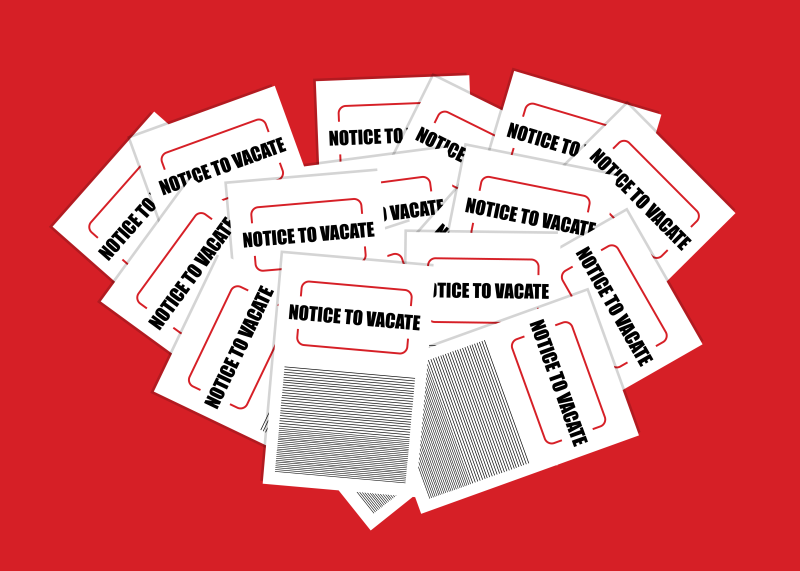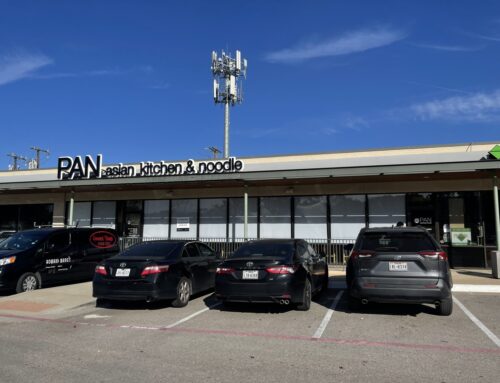
Illustration by Jessica Turner.
The numbers are jarring, at first blush — they show that more landlords have filed evictions in Lake Highlands than in any other part of Dallas County. In fact, five of 10 so-called “eviction hotspot” addresses are in the 75243 ZIP code, according to Princeton’s Eviction Lab.
The pandemic did not cause the situation, but focus on housing and inequity brought on by the crisis could wake up advocates, leaders and policymakers as they allot attention and resources.
We posed questions about the data to our City Council representative, eviction lawyers, apartment community owners, trade associations and housing advocates. They are helping us to determine why District 10’s evictions are elevated compared to the rest of the city, who is affected, what it means for the neighborhood and how data can help solve longstanding local housing problems.
Using information collected from Child Poverty Action Lab, Princeton’s Eviction Lab shows as of October, 25% of all evictions in Dallas County were filed by just 100 plaintiffs. 75243 has the highest numbers of renters threatened with eviction countywide. No. 1, 2, 6, 7 and 9 of the top 10 are in a two-mile radius around Forest Lane and I-635. U.S. Census data show this ZIP code includes 42.9% Black and 24.4% Hispanic residents.
In the census tract that includes almost exclusively 11911 Audelia — where a cluster of apartments has Dallas County’s highest eviction rate — just 12% of the 6,000 residents are white. Sixty-seven percent are Black, 17% are Hispanic and the per capita income is less than $20,000 per year.
Fifty-three percent of those residents are women, and 10% of them gave birth in the past year (more than 1.5 times the average in Dallas County or City). Almost 33% were born outside the United States. Languages spoken in these homes include English, Spanish, Indo-European and Asian, and more than 20% speak “other languages.” This makes communication between landlords and tenants difficult and is a barrier to accessing assistance from governments or nonprofits.
To compound matters, researchers at Harvard showed nationwide, people of color have been hurt at four times the rate of white Americans during the pandemic.
Eviction filings in Dallas were higher than average in months prior to the pandemic. They dipped in March, after the Centers for Disease Control and Prevention enacted a moratorium on evictions to slow the spread of COVID-19. Filings as of October remain below historical averages.
Why it’s important
The concentrated number of evictions could tell us something about Dallas’ affordable housing crisis and pinpoint areas in most need. Lack of affordable housing sits at the root of a host of social problems, from poverty and homelessness to educational disparities and health care. Studying its causes and consequences — and creating solutions — depends on reliable data, according to the creators of Princeton’s Eviction Lab.
What the data shows
It is concerning but not surprising to see five of 10 eviction hotspots located in his district, City Councilman Adam McGough says. He and other D10 advocates cast ever-present, ongoing focus on Lake Highlands’ apartment communities and the approximately 104,000 renter households here.
He says evictions are painful for the whole community.
“It is significant, terrible, tragic, even, for the life that it interrupts, their mental and physical health,” McGough says. “When a family is evicted and moves, they may have to pull children out of the neighborhood school, which creates a whole other set of problems. That ties into all the other quality of life issues we are working on in this area.”
He says he is concerned about how evictions and transient residencies affect neighborhood schools. It can make it difficult to keep track of students.
McGough doesn’t see an immediate link between an eviction and someone landing on a street, though conventional wisdom dictates a “logical connection” to homelessness.
“We kind of have a huge problem already. So it’s hard to see if anything has changed. The people that I’ve gone and spoken with that are either panhandling or homeless have not expressed that they are in that category where they have just been evicted,” McGough says. “[Once evicted] people tend to get on a path of staying with family, on couches and eventually shelters, so it can lead to homelessness, of course. We might not be seeing that yet.”
While the impulse might be to extend the moratorium and stop evictions, that probably would not be the best thing for the neighborhood.
Since long before McGough took his seat, home and business owners in Lake Highlands have demanded multifamily property managers take responsibility for curbing crime. McGough points out that the ability to evict for reasons other than nonpayment is an integral part of responsible multifamily management. They also rely on rents for funding property upkeep along with paying taxes and other management expenses.
McGough helped draft Dallas’ COVID-19 eviction ordinance which gives residential tenants time to make arrangements for the payment of rent because of the loss of wages or medical expenses due to COVID-19.
The federal government allotted $50 billion in funds for housing relief through the federal Coronavirus Aid Relief and Economic Security Act. McGough says the City has been doing good work putting the money to the areas that need it most. One of the biggest challenges in 75243 is getting the information about available assistance to the people who need it.
The eviction and affordable housing crisis is nothing new, he says. What he has learned during this time is the need to focus on long-term solutions.
He says working with so many families on the verge of losing their homes has him “doubling down” his commitment to building developments that include both housing and workforce development and innovation and result in more living wage jobs. “You have to have consistent income to have consistent housing,” he says.

Eviction lawyer Mark Melton
Mark Melton is a White Rock area homeowner who typically deals with hedge funds and private equity firms. But early in the pandemic he began offering free advice to renters facing legally questionable evictions. Having faced eviction as a younger man, he says, he could not turn them away. The desperation was disproportionately high among poor people of color and women, he says. Eventually he and his wife, Lauren, launched a nonprofit called Dallas Eviction Advocacy Center to back disenfranchised tenants battling lawyered-up landlords in Dallas County’s Justice Courts.
Each weekday, the center sends a postcard to every renter in the county who has a new eviction filing, letting them know they can help.
He says in almost every case (all but nine of 2,000 in a six-month period), there has been something that could be done to keep the home, be it pointing out plaintiff illegalities or helping to procure rental assistance.
“While laws exist to protect people, evictions rarely happen in accordance with the law, because the tenants don’t know any better themselves,” Melton says.
The root cause of our housing crisis is not pandemic specific, Melton says. But through COVID-19 he was reminded of the struggles poor people face.
“The populations in the apartments are vulnerable. You miss work because you’re sick, or your job is down, or whatever happens, you’re screwed,” Melton says. “It’s an issue we see across the country, and the disproportionality of evictions, based on race, are pretty stark.”
COVID-19 collided with a slow-boiling crisis rooted in the income-rent gap.
“How do you take a bigger-picture view of this? You need to have more housing that’s actually affordable based on income. Just see how much an apartment is [in 75243],” Melton says. “They’re taking home a couple thousand a month and spending half on housing? That’s not affordable housing. That is a larger economic problem.”
Melton says the glut of his work happens in South Dallas. He was not aware more evictions were taking place in northeast Dallas than in the southern sector, but he says he is not surprised because poor, dense and highly diverse parts of the city are suffering the most.
He points out that — armed with new, comprehensive data and a waterfall of unprecedented resources — maybe we are in a unique position to remedy longstanding core housing issues.
Jason Simon, director of government affairs at the Apartment Association of Greater Dallas
Simon says the apartment association has worked with the City, McGough and the Lake Highlands Public Improvement District to curb crime that once was out of hand in our neighborhood. The AAGD even helped to finance a youth boxing gym at Forest-Audelia, he points out. But tamping down criminal activity can mean evicting people.
While the Eviction Lab data is valuable and interesting, Simon says, it does not tell the whole story.
“One thing is it does not parse out non-payment of rent evictions versus evictions for other reasons,” he says. “Some of our members have actually gone in and acquired some properties over there. Historically it’s been a difficult area, and we can’t help clean that up without the tools to be allowed to remove tenants.”
Another concern with some of the data is that it looks at eviction filings, and there’s a big difference between filing an eviction and an actual physical removal.”
Sometimes landlords serve a notice to get a non-paying tenant’s attention — “to get them to come talk to us,” he says.
Simon points out that if they just communicate, tenants can keep their home. They can pay the property owners through emergency rental assistance programs.
“For members [of the apartment association], eviction is a last resort,” Simon says. “It doesn’t make sense financially to evict. It doesn’t make sense on a human level, really in a lot of ways, so it really is our last resort.”
Dawn Waye, president of City Gate Property Group
Dawn Waye’s property management company oversees one of the addresses on the “eviction hotspot” top 10, Forest Cove at 9600 Forest Lane, along with other complexes in the area. Forest Cove took over a problem property last summer and is now moving forward with some evictions, she says.
But the tenants being evicted for nonpayment, she says, are those who have ignored genuine, consistent efforts from the management to help them.
“We work really hard on bringing the community aspect into the apartments and into people’s homes, their sanctuary, which we understand is central to their lives,” she says. “The last thing we want to do is put anybody out of their home. That is definitely not the heart or the flair of the people that I work with in the industry.”
Property owners need to fund payrolls, pay taxes, mortgages and maintenance — that money comes from people paying rent. Some tenants had not paid anything for a year or more, Waye explains. When the moratorium expired, City Gate brought in an organization called Under One Roof, a nonprofit that offers aid to families facing homelessness. Its volunteers helped tenants apply for rental assistance.
“We knocked on doors, called, printed fliers and we made sure our staff was treating people compassionately, because we know fear can keep a person from coming in and asking for help,” she says.
The first time Under One Roof visited Forest Cove, at least 25 households were able to benefit, Waye says.
Under One Roof alone has $750,000 in rental assistance funds to disburse, she says, and they will keep coming back until those funds are exhausted. Those volunteers along with property managers helped with translation and completing all the paperwork.
“All the tenants had to do was come down, acknowledge their rent would be paid and sign,” Waye says.
Ashley Brundage, executive director of housing stability and senior vice president of community impact at United Way
Citywide, clients coming to United Way for assistance are about 80% Black and 70% women who are head of household. “Which means more often than not, you’re seeing single mothers who are facing eviction,” she says.
Early in the pandemic United Way saw a 50% rise in traffic to its website for information on rental assistance so it increased eviction prevention efforts. United Way is in the process of identifying partners in eviction hotspots to distribute rental assistance funds faster. They will launch that in January. “That should be a huge help in those neighborhoods,” Brundage says.
Most landlords have been helpful, she says.
“There’s both sides,” she says. “Some landlords are done, they need to get paid because they’ve got bills to pay, and they’re moving forward with evictions, and others who are doing more to help their clients out. And I can understand both ends of it.”
Not all evictions end up in homelessness, but options are shrinking because of the pandemic.
“We are seeing more people experiencing homelessness during this time and part of that is because everybody’s safety nets that they would normally rely on have been stressed and stretched to the max,” she says. “There are not any funds to lend somebody or an extra room for somebody.”
It is more costly to rehouse somebody than to keep them in their homes.
“That’s why it’s super important that we get rental assistance out because if we can help pay for rent and provide some wraparound services to get somebody back into a job. It takes a lot less toll on the community than having to put them through the entire rehousing system that they would enter if they’re homeless.”
While it has had to respond to the national emergency, United Way’s staff approaches the housing issue on a continuum, also focusing on workforce training that will result in living wage employment.
“Getting women into the construction industry, getting people from entry level into middle skills jobs within information technology in the health industry — we have several,” she says.
Brundage hopes lessons learned during the pandemic can lead to sustainable solutions.
“If anything good has come out of this, it is how well our organizations across the community have coalesced and come together to serve clients,” Brundage says. “We keep saying to each other, ‘We can’t let this go. We are creating so many good things. We’ve made such good headway that once COVID is gone, we can’t let that falter.’”
Resources:
The City of Dallas Eviction Assistance Initiative offers outreach and community education, legal representation and more. Call 1.888.529.5277 or visit Legal Aid of Northwest Texas.





